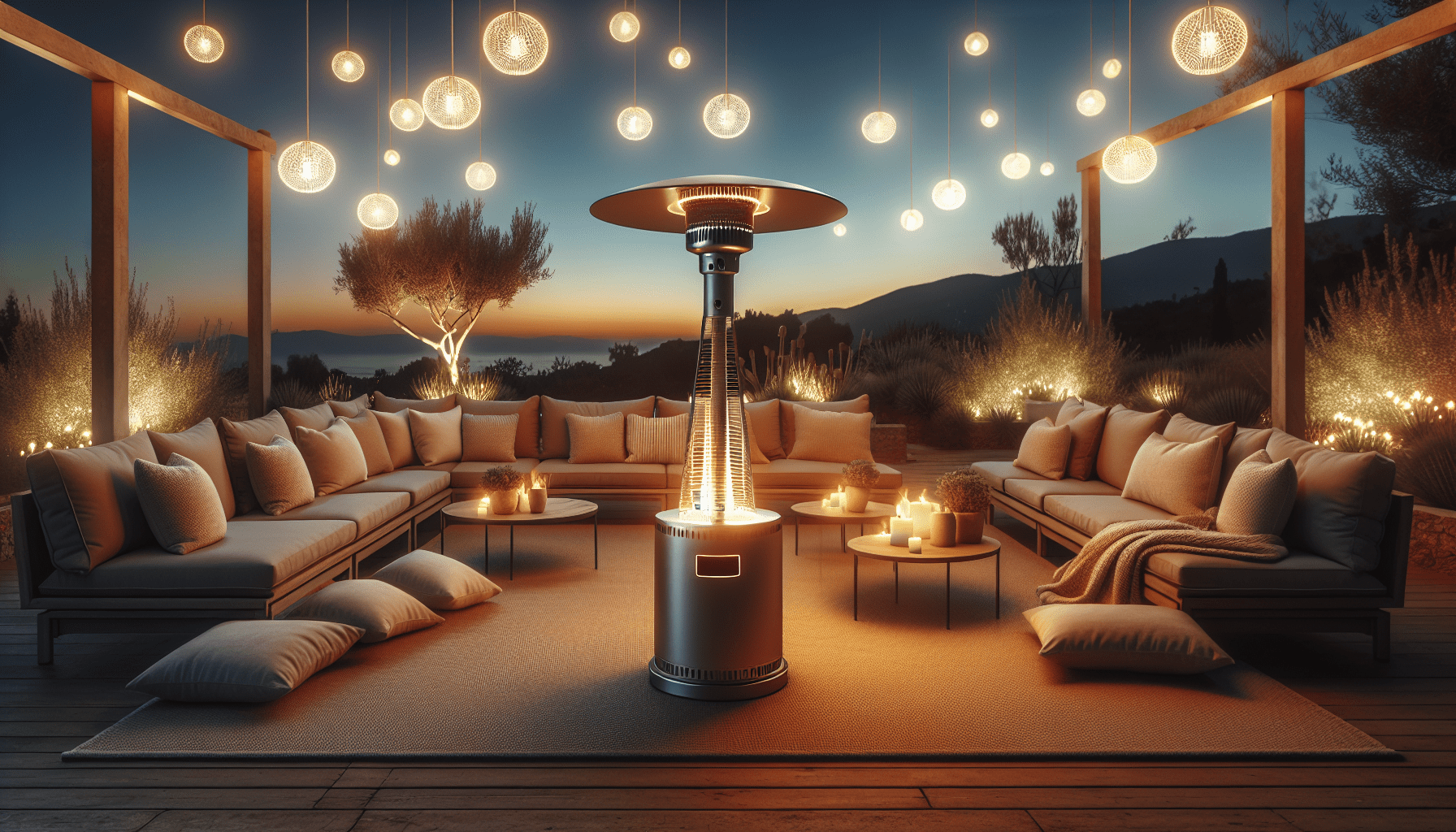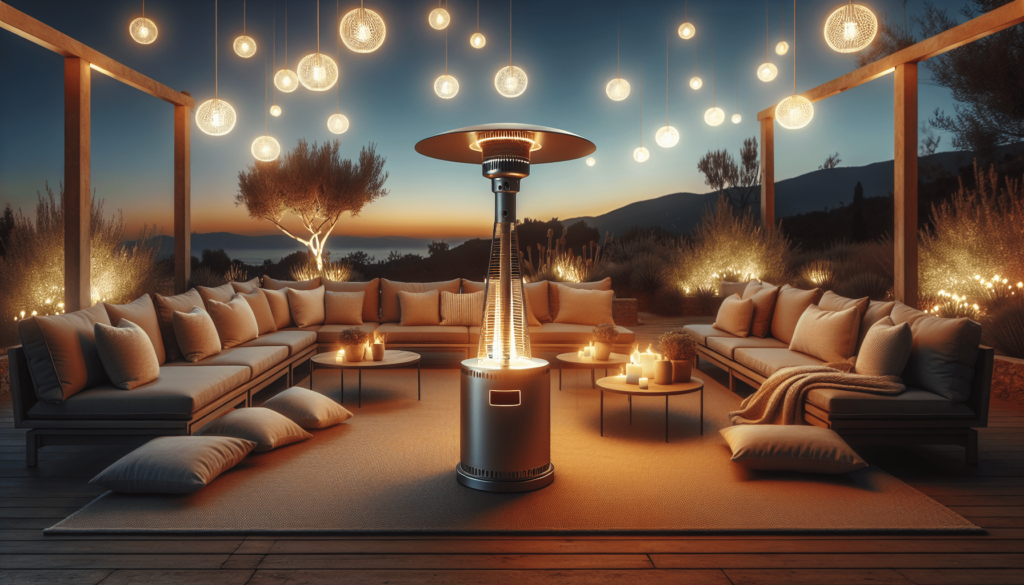
Have you ever stepped onto a patio on a chilly evening and wondered how some people manage to keep the warmth comfortably contained while others seem to be shivering away? The secret often lies in the strategic placement of a trusty patio heater. Patio heaters can make a world of difference in transforming your outdoor space into a cozy haven, perfect for gatherings or solo retreats. Let’s walk through the process of how you can position yours for maximum effect and ensure that warmth is evenly distributed, allowing you and your guests to savor every outdoor moment regardless of the season.
Understanding Different Types of Patio Heaters
Before deciding on where to position your patio heater, it’s essential to understand the types available and their specific heating mechanisms. Each type has its benefits, best use cases, and limitations.
Gas-Powered Patio Heaters
Gas-powered patio heaters, such as those offered by well-known brands like Amazon Basics or Fire Sense, either use propane or natural gas as their fuel source. They are often favored for their ability to deliver considerable BTUs, providing substantial warmth over a decent radius. Propane heaters are versatile since they don’t need to be connected to a gas line, making them mobile and easy to reposition if necessary. However, they do require you to keep an eye on the fuel level.
Natural Gas Heaters, on the other hand, are connected directly to a gas line, providing continuous heating without the need to replace tanks. The downside is that their fixed position means you have to plan strategically where you place them to ensure optimal warmth distribution.
Electric Patio Heaters
Brands such as Heat Storm or Bromic Heating offer electric heaters that are a more environmentally friendly and easily controlled option. They often feature adjustable heat settings and don’t produce any direct emissions. Being powered by electricity, these heaters are also quite versatile in terms of installation. They can be wall-mounted or free-standing, which makes positioning them easier according to your needs. Some even come with infrared capabilities to provide instant heat.
Wood-Burning Patio Heaters
The charm of the traditional wood-burning patio heater remains undeniable, blending functionality with aesthetics. A product by Sunnydaze Decor, for example, offers a rustic appeal with the sound of crackling wood adding ambiance to any evening gathering. However, they do require a steady supply of wood, a safe enclosure, and regular cleaning.
Identifying Your Patio Layout and Needs
Knowing the type of patio heater you need is just the beginning. To maximize its effectiveness, you should evaluate your patio’s layout and your personal heating requirements.
Size and Shape of Your Patio
Is your patio large and sprawling or cozy and compact? Different patio sizes require different heating approaches. For more expansive layouts, you may need multiple heaters or a single, high-BTU unit to cover the area effectively. For smaller patios, a single, strategically placed heater might suffice.
Wind and Weather Patterns
Pay attention to the natural elements around your patio. Wind can significantly affect how heat is distributed, often leading to uneven warmth. Identifying natural wind barriers, like walls, fences, or shrubbery, can help guide the placement of your heater for better comfort.
Patio Use Frequency and Functionality
Consider how often you use the patio and what activities typically take place. If it’s a space frequently used for dining, making sure the heater is positioned to keep all guests warm is critical. Alternatively, if it’s more of a lounge area, strategic overhead heaters may provide a more consistent and enveloping warmth.

Best Practices for Heater Placement
Once you have understood your patio layout and heater type, the next step is deciding exactly where to place these heaters to maximize their efficacy.
Safe and Efficient Positioning
Safety should always be your priority. Ensure your heaters are positioned away from flammable materials. Gas heaters in particular should be set in open, well-ventilated spaces to prevent any buildup of harmful fumes. Similarly, avoid hanging anything that might obstruct or come in contact with the heat source.
Center Stage or Perimeter Placement?
Deciding whether to place your heaters centrally or along the perimeter depends on your seating arrangement and the area you intend to heat. Central placement can encourage friends to gather around, enjoying an evenly distributed heat circle. Alternatively, placing heaters on the perimeter can help radiate warmth inward, which might be better suited if furniture and social space are more spread out.
Height and Angle Considerations
For mounted or ceiling heaters, the angle and height are crucial in determining how broadly and directly heat will be dispersed. Higher mounting provides a larger heating radius, but it might lead to a dissipation if ceilings are excessively high. Manufacturers, such as Briza, often provide recommended mounting heights in their manuals.
Presenting Different Scenarios
| Scenario | Recommended Heater Type | Optimal Placement Strategy |
|---|---|---|
| Dining Area | Propane Patio Heater | Centralized between tables to ensure even heat dispersion. |
| Lounge Space | Wall-Mounted Electric | Perimeter placement with heaters at an angle for broad coverage. |
| Transitional Zones | Portable Propane Heater | Near entry points to maintain warmth when moving between indoors and outdoors. |
Case Studies Of Effective Heater Placement
It can be insightful to explore real-world examples of how others have successfully positioned their patio heaters.
Example 1: Rooftop Bar Setup
Consider a rooftop bar that uses Bromic’s Electric Heaters for an open-air seating arrangement. The heaters are mounted strategically around seating sections, with the angles adjusted to focus heat efficiently on table areas. The ceiling height remains optimal to prevent heat loss and maintain warmth during cooler evenings.
Example 2: Residential Backyard Space
In a large residential backyard, multiple Amazon Basics Propane Heaters are used. Positioned near the outdoor dining area and around the poolside, they create pockets of warmth. Attention is given to wind direction and placement ensures guests remain comfortable regardless of seating choice.

Maintaining Your Patio Heater
Your patio heater’s performance is heavily reliant on regular maintenance to keep it in top shape.
Cleaning and Inspection
Regular cleaning of the heating elements and surroundings, especially for gas-operated models, reduces the risk of malfunctions. It’s advisable to inspect connections and hoses for any signs of wear or punctures.
Seasonal Storage
When warmer months approach, storing your heaters correctly ensures they remain functional year-round. Ensure propane tanks are detached, heaters are cleaned, and if possible, stored in a dry location.
Elevate Your Entertaining Space
Properly placed heaters not only improve comfort but also enhance the ambiance of your patio. They transform the area into an inviting environment, encouraging longer stays and more frequent use, regardless of temperature dips. Consider lighting options, such as string lights or lanterns, to complement the heaters and further elevate the aesthetic.
Concluding Thoughts
The magic of your outdoor space isn’t just in the furniture pieces chosen or the view. It’s in the ambiance created—much of which relies on warmth and comfort as the evening chill sets in. By carefully selecting and placing your patio heaters, you craft an inviting retreat, extending the usability and enjoyment of your outdoor space year-round.
Your guests will thank you as they relax under a comforting blanket of warmth, whether they’re gathered for a lively evening or a peaceful night of stargazing.



